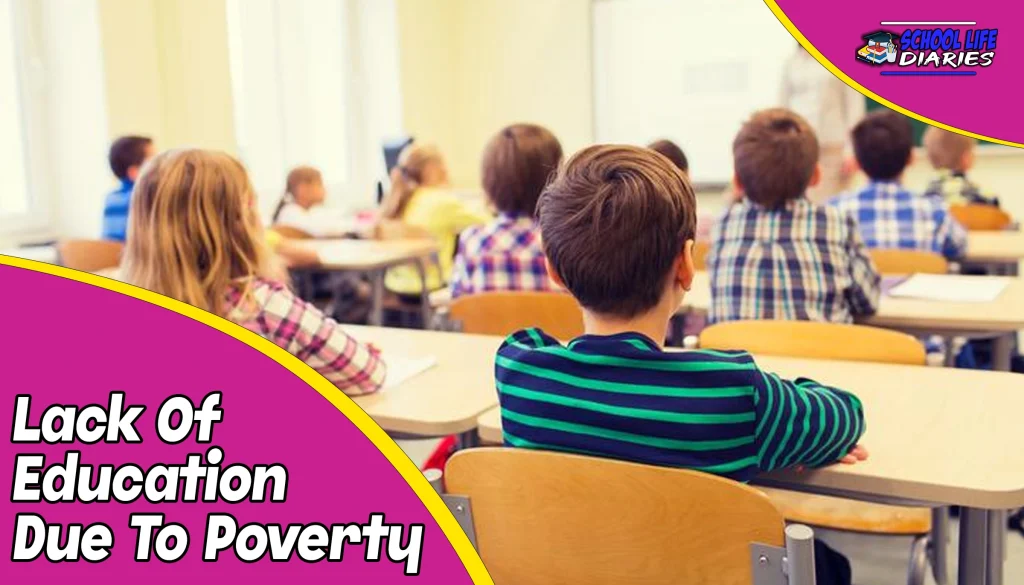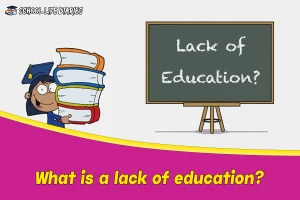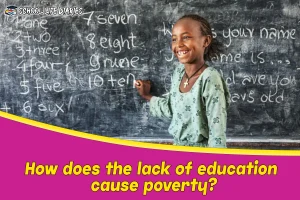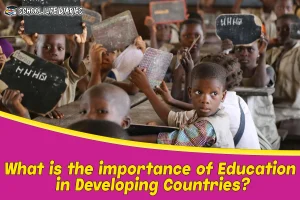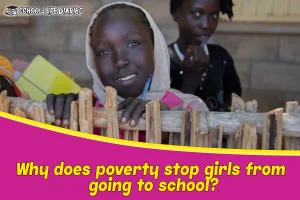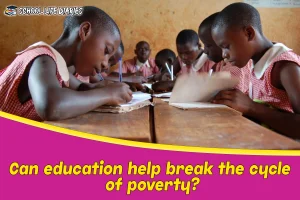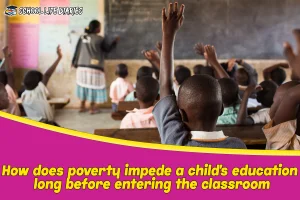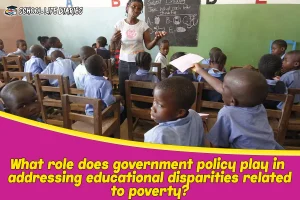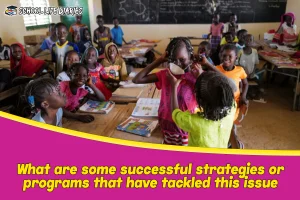The lack of education due to poverty is a pressing issue that affects individuals, families, and entire communities worldwide. Education is not only a fundamental human right but also a powerful tool for personal and societal development.
In many developing countries, poverty limits access to education by creating financial burdens that families cannot overcome. The costs associated with school fees, uniforms, textbooks, and transportation can be overwhelming for impoverished households. As a result, children from these backgrounds are often forced to drop out of school or never enroll in the first place. This lack of education further hinders their chances of escaping poverty in the long run.
What is a lack of education?
Lack of education refers to the absence or insufficiency of formal learning opportunities and access to knowledge, often resulting from economic constraints and limited resources. It is a state where individuals are deprived of the chance to acquire essential skills, knowledge, and information necessary for personal development and social progress. This lack of education has profound consequences on both individual lives and society as a whole.
The impact of a lack of education is far-reaching. Without proper schooling, individuals are unable to develop critical thinking skills or gain the necessary knowledge to participate fully in their communities. They may struggle with finding employment or earning a livable wage, perpetuating the cycle of poverty that initially prevented them from obtaining an education.
Lack of education due to poverty has severe consequences on individuals’ lives and societies at large. It hinders personal growth while perpetuating socioeconomic disparities.
How does the lack of education cause poverty?
Insufficient access to educational opportunities perpetuates a cycle of limited knowledge and economic disadvantage. The lack of education is a key factor in the perpetuation of poverty, as it hinders individuals from acquiring the necessary skills and knowledge to secure well-paying jobs. This leads to limited economic opportunities, making it difficult for individuals to escape poverty and improve their socioeconomic status.
One of the primary economic impacts of a lack of education is the limited opportunities it presents for individuals. Without proper education, individuals often find themselves restricted to low-skilled jobs with little room for advancement or financial stability. The inability to acquire new skills or pursue higher education prevents them from accessing job markets that offer better wages and benefits. As a result, they remain trapped in low-paying jobs with few prospects for upward mobility or increased earnings.
What is the importance of Education in Developing Countries?
Education plays a crucial role in the development of countries, fostering economic growth, social progress, and individual empowerment. In developing countries, where poverty is often prevalent, education becomes even more important as it is a powerful tool to break the cycle of poverty. Lack of education perpetuates poverty by limiting opportunities for economic advancement and hindering social development.
One of the key reasons why education is vital in developing countries is its potential to alleviate poverty. Education equips individuals with knowledge and skills that are essential for securing better job opportunities. When people have access to quality education, they can acquire the necessary skills to participate in the workforce and contribute to their country’s economy. This not only improves their living standards but also stimulates overall economic growth by increasing productivity and innovation.
The importance of education in developing countries cannot be overstated. Education not only helps individuals escape poverty but also contributes to economic growth and social progress within these nations. By investing in quality education for all, particularly focusing on girls’ education, governments can pave the way towards a brighter future with increased opportunities for everyone while simultaneously addressing issues such as poverty and gender inequality head-on.
Why does poverty stop girls from going to school?
The economic deprivation experienced by girls in impoverished communities often serves as a significant barrier to their access to formal schooling. Gender inequality, deeply ingrained in many societies, plays a crucial role in perpetuating this cycle of poverty and limited educational opportunities for girls.
Cultural barriers and traditional norms restrict the freedom of girls, resulting in them being denied access to education. In many impoverished communities, gender inequality remains a pervasive issue that hinders girls’ education. Deep-rooted cultural beliefs and societal expectations often prioritize boys’ education over girls’. Girls are expected to fulfill domestic roles and contribute to household tasks from an early age, limiting their opportunities for formal schooling. This systemic discrimination reinforces gender disparities and denies girls the chance to acquire knowledge and skills that could help break the cycle of poverty.
Poverty poses significant obstacles for girls seeking an education in impoverished communities. Gender inequality perpetuates cultural barriers that limit their freedom and deny them access to formal schooling. Additionally, the lack of resources, child labor, and early marriage further exacerbate this issue.
Can education help break the cycle of poverty?
Empowering individuals through access to knowledge and skills has the potential to break the cycle of intergenerational disadvantage and ignite hope for a brighter future. Education’s impact on social mobility cannot be overstated. By providing quality education to individuals living in poverty, we equip them with the tools necessary to rise above their circumstances and improve their economic prospects.
Education serves as an equalizer, allowing individuals from disadvantaged backgrounds to compete on a level playing field with their more privileged peers. Breaking the cycle of poverty requires addressing its root causes, and education plays a crucial role in this process. By equipping individuals with knowledge and skills, education empowers them to secure better-paying jobs, increase their earning potential, and escape the clutches of poverty.
How does poverty impede a child’s education long before entering the classroom?
Education has long been hailed as a potential solution to breaking the cycle of poverty.
This is particularly evident in early childhood development, where children from impoverished backgrounds face numerous obstacles that hinder their educational progress. One significant factor is the lack of access to quality resources. Children growing up in poverty-stricken households often do not have the same opportunities for learning materials, books, and technology as their more privileged peers.
Poverty significantly impedes a child’s education long before they enter formal schooling. The lack of access to quality resources hinders their learning potential while nutritional challenges affect cognitive abilities. Moreover, limited parental involvement and scarce opportunities for extracurricular activities further compound the disadvantages faced by these children. To break this cycle, it is crucial to address these barriers and provide equal educational opportunities for all children, regardless of their socioeconomic background.
What role does government policy play in addressing educational disparities related to poverty?
Government policy plays a crucial role in addressing the disparities in educational opportunities for children affected by poverty, as it has the power to create an equitable and inclusive system that ensures all students have access to the resources and support necessary for their academic success.
One way government initiatives can address these disparities is by providing additional funding sources specifically targeted toward schools in low-income areas. This additional funding can be used to improve school infrastructure, hire qualified teachers, and provide necessary learning materials. By investing in these areas, the government can help bridge the gap between schools in high-poverty areas and those in more affluent communities.
What are some successful strategies or programs that have tackled this issue?
One effective strategy that has successfully addressed the issue of educational disparities related to poverty is the implementation of community-based mentorship programs. These programs involve experienced professionals from various fields who volunteer their time to provide guidance and support to students in low-income areas. By connecting students with mentors who can serve as positive role models, these programs aim to inspire and motivate them to overcome the challenges they face due to poverty.
What sets community-based mentorship programs apart from other strategies is their emphasis on community involvement. These initiatives bring together individuals from diverse backgrounds who share a common goal: improving educational outcomes for students affected by poverty. The involvement of volunteers from different professions exposes students to a wide range of career possibilities and helps them develop important social skills necessary for success in life.
Successful strategies such as community-based mentorship programs have proven effective in addressing educational disparities related to poverty. By providing guidance and support through one-on-one mentoring sessions, these initiatives empower students in low-income areas to overcome challenges associated with limited resources and opportunities. The emphasis on community involvement further strengthens the impact of these programs by fostering a supportive network that extends beyond academics.
Conclusion: Lack Of Education Due To Poverty
In conclusion, the lack of education due to poverty is a significant issue that hinders development and perpetuates the cycle of poverty in many countries. This lack of education not only limits individuals’ opportunities for personal growth and economic advancement but also slows down the progress of society as a whole.
The link between poverty and lack of education is undeniable. Poverty often prevents children from accessing quality education, leading to limited skills and knowledge that are crucial for breaking the cycle of poverty. Education plays a vital role in developing countries by empowering individuals with the knowledge, skills, and tools needed for social and economic progress. It provides opportunities for individuals to escape poverty, improve their living conditions, and contribute positively to society.
Successful strategies or programs aimed at tackling this issue include initiatives focusing on improving access to education in marginalized communities, promoting gender equality in schools, providing financial support for low-income families, and investing in teacher training and infrastructure improvements. By addressing the root causes of educational disparities related to poverty, societies can break free from the vicious cycle of deprivation and unlock their full potential for sustainable development.

